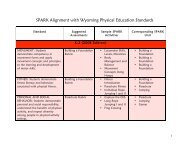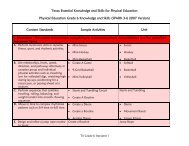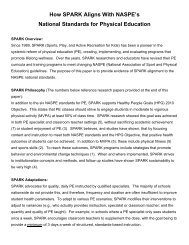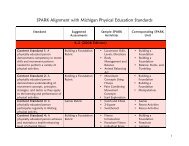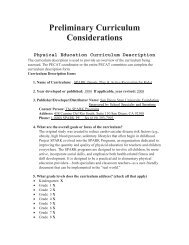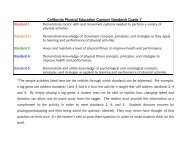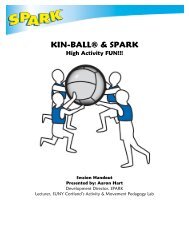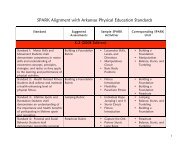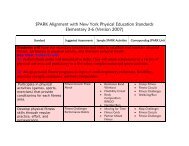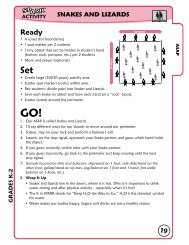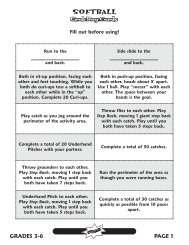Sample Text for Grant Writers - Spark Physical Education
Sample Text for Grant Writers - Spark Physical Education
Sample Text for Grant Writers - Spark Physical Education
You also want an ePaper? Increase the reach of your titles
YUMPU automatically turns print PDFs into web optimized ePapers that Google loves.
Botvin, G., Eng, A., & Williams, C. “Preventing the onset of cigarette smoking through life skills training.”Preventive Medicine, 1980. 9, 135-143.Centers <strong>for</strong> Disease Control and Prevention Coordinated School Health. (http://www.cdc.gov/HealthyYouth/CSHP/)Colleti, G., Supnick, J. A., & Payne, T. J. “The smoking self-efficacy questionnaire (SSEQ): Preliminaryscale development and validation,” Behavior Assessment, 1985. 7, 249-260.Condiotte, M. M., & Lichtestein, E. “Self-efficacy and relapse in smoking cessation programs,” Journal ofConsulting and Clinical Psychology, 1981. 49, 648-658.Fisher, J. D., & Fisher, W. A. Theoretical approaches to individual level change in HIV risk behavior. In J.L. Peterson & R. J. DiClemente (Eds.), Handbook of HIV Prevention (pp. 3-55). 2000. New York: KluwerAcademic/ Plenum Publishers.Holman, H., & Lorig, K. Perceived self-efficacy in self-management of chronic disease. In R. Schwarzer(Ed.), Self-efficacy: Thought control of action (pp. 305 – 323). 1992. Washington, DC: Hemisphere.Perry, C. L., Kelder, S. H., & Klepp, K. I. “Community-wide cardiovascular disease prevention with youngpeople: Long term outcomes of the class of 1989 study.” European Journal of Public Health, 1994. 4,188-194.Perry, C., Killen, J., Telch, M., Slinkard, L., & Danaher, B. “Modifying smoking behavior of teenagers: Aschool-based intervention.” American Journal of Public Health, 1980. 70, 722-725.Perry, C.L., Story, M., & Lytle, L.A. Promoting Healthy Dietary Behaviors. In R.P. Weissberg, T.P. Gullotta,R.L. Hampton, B.A. Ryan, and G.R. Adams (Eds.), Enhancing Children’s Wellness Vol. 8: Issues inChildren’s and Families’ Lives (pp. 214-249). 1997. Thousand Oaks, CA: Sage Productions.Strecher, V. J., DeVellis, B. M., Becker, M. H., & Rosenstock, I. M. (1986). The role of self-efficacy inachieving health behavior. Health <strong>Education</strong> Quarterly, 13, 73-91.5. Awards & HonorsHealthy Kids Challenge is a recipient of the American Dietetic Association’s Anita Owen Award<strong>for</strong> Most Innovative <strong>Education</strong>al Program and the C.A.N. and the Advertising Council -CommunityAction Network (CAN) Community Action Networks Service Award Honoring the Media & CorporateCommunities <strong>for</strong> Outstanding Solutions to Social Problems.Cooking Light named HKC one of the “Top 12 Change Makers in Nutrition” over the past 25 years. ACooper Clinic study awarded HKC a “Silver” ranking <strong>for</strong> programming.XII. Supplemental Healthy Lifestyle Choices (HLC) In<strong>for</strong>mation1. ResultsThe Pacific Institute <strong>for</strong> Research and Evaluation (PIRE) conducted a three-year evaluation of HLCprogramming and documented the following outcomes:a. Children exposed to HLC programming have significantly higher health knowledge than peers withoutHLC.In fact, children with vastly different standardized test scores achieved comparable scores in the HLCHealth Literacy Challenge after multi-year exposure.Page 44Back to Topwww.sparkpe.org| 1 800 SPARK PE | spark@sparkpe.org | SPARKprograms | SPARK_Programs



